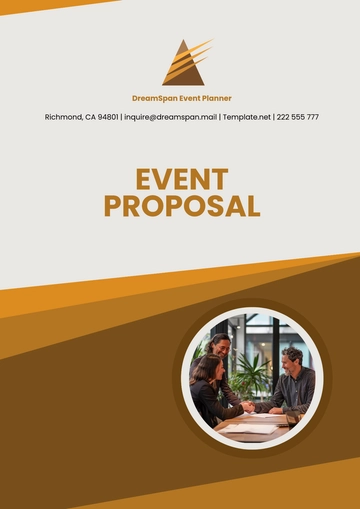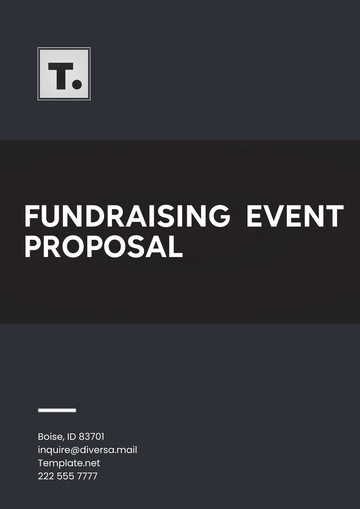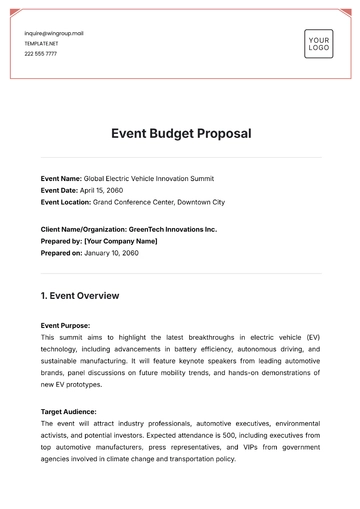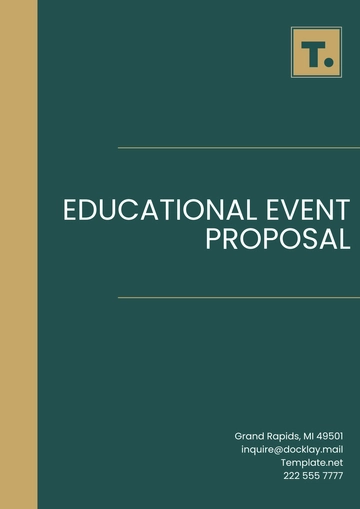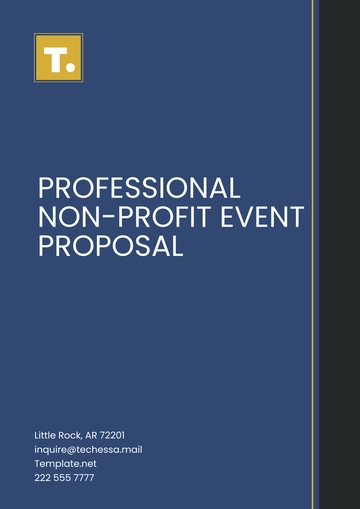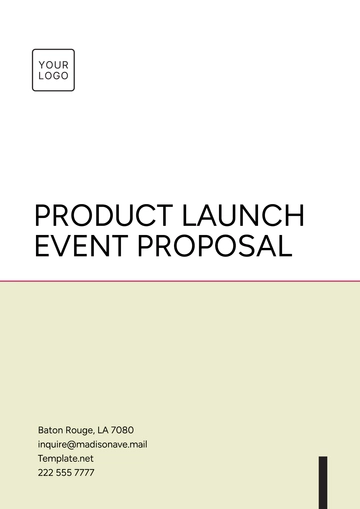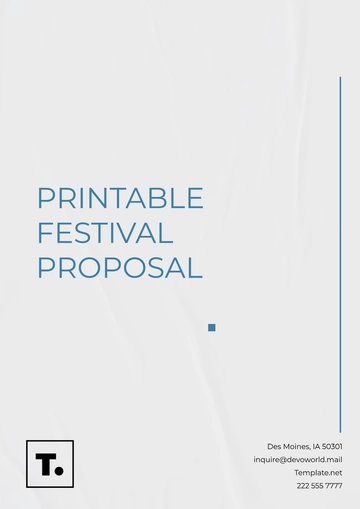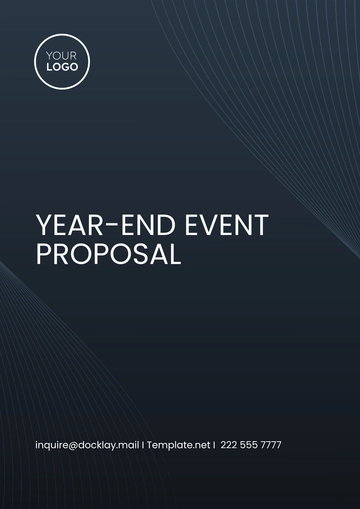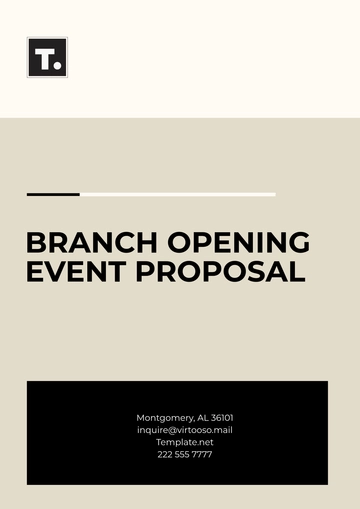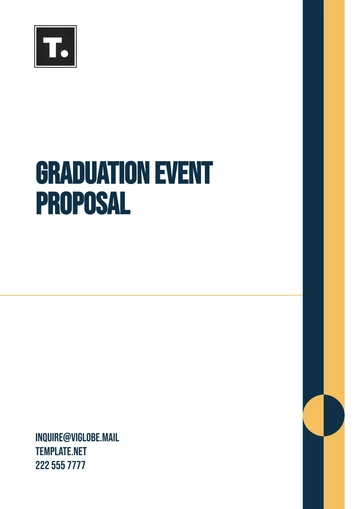Free Church Seminar Proposal Design
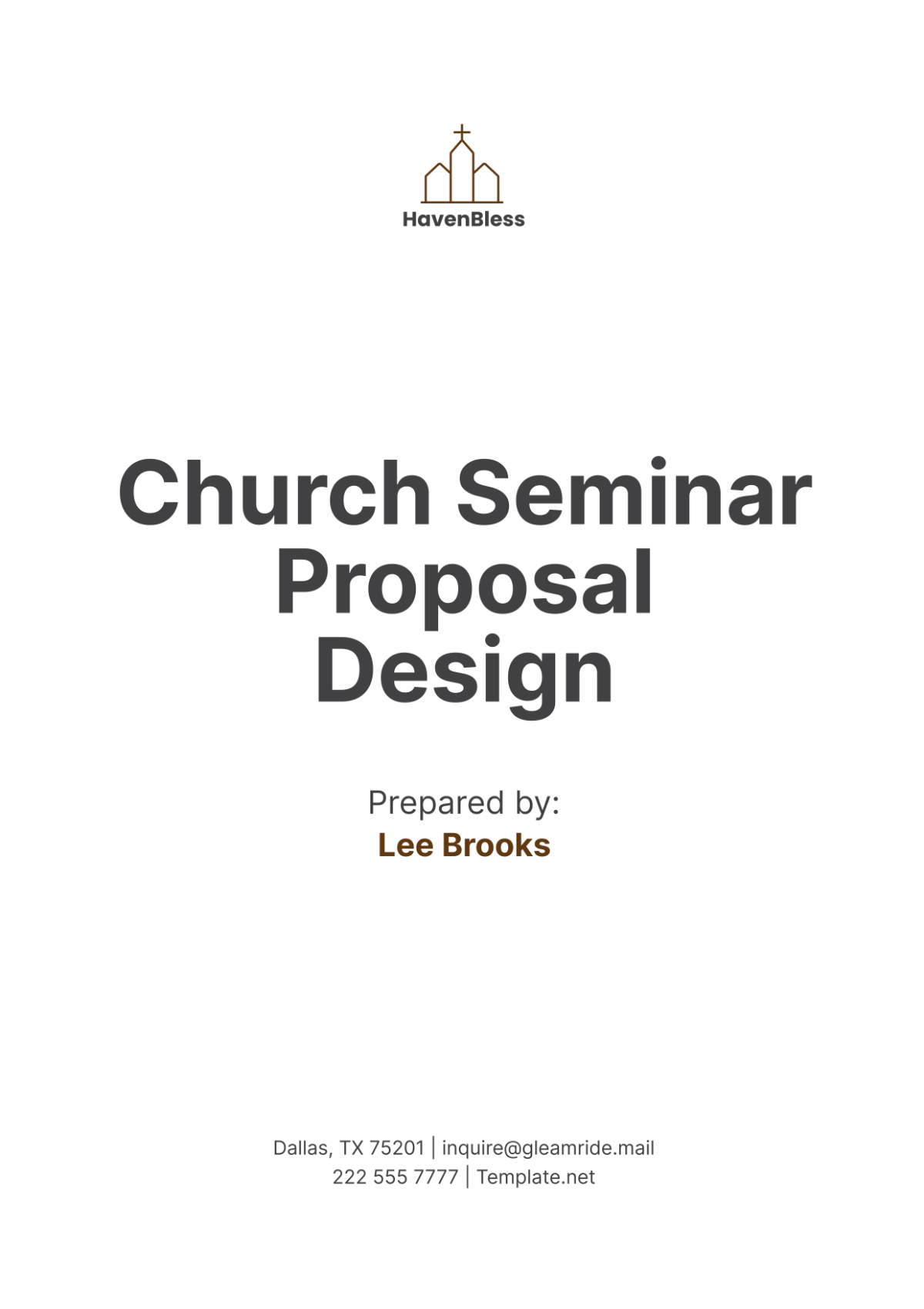
I. Introduction
The purpose of this proposal is to outline a comprehensive plan for a series of seminars to be held by [Your Company Name] throughout the year [2050]. These seminars aim to provide spiritual enrichment, educational opportunities, and community engagement for our congregation and the wider community. This proposal details the proposed seminar topics, schedules, budget, and logistical considerations necessary for successful implementation.
A. Scope
The seminars will cover a wide range of topics including spiritual growth, community service, leadership development, and practical life skills. The audience will include church members, local community residents, and visitors. The seminars are designed to cater to various age groups and interests, ensuring broad participation and engagement.
II. Seminar Objectives
Establishing clear objectives for the seminar series is essential for aligning the program with [Your Company Name]'s mission and goals. The objectives provide a framework for evaluating the success and impact of the seminars.
A. Spiritual Enrichment
Deepening Faith: Encourage participants to deepen their understanding and practice of their faith through engaging and thoughtful presentations.
Biblical Literacy: Increase knowledge of the Bible and its teachings, fostering a stronger spiritual foundation.
Personal Reflection: Provide opportunities for personal reflection and spiritual growth through guided discussions and activities.
Community Prayer: Strengthen communal bonds through collective prayer and worship experiences.
B. Educational Development
Knowledge Expansion: Offer educational content that broadens participants' understanding of various topics, including theology, ethics, and social issues.
Skill Development: Equip attendees with practical skills for leadership, financial management, and community service.
Lifelong Learning: Promote a culture of lifelong learning within the church community, encouraging continuous personal and professional development.
Resource Provision: Provide access to resources such as books, study guides, and online materials to support continued learning.
C. Community Engagement
Inclusivity: Ensure that the seminars are inclusive, welcoming individuals from diverse backgrounds and experiences.
Outreach: Use the seminars as a tool for outreach, inviting non-members and the local community to participate and learn about the church's mission.
Networking: Facilitate networking opportunities for participants, allowing them to connect with like-minded individuals and build supportive relationships.
Service Initiatives: Integrate service initiatives into the seminar schedule, encouraging participants to engage in community service projects.
D. Organizational Growth
Volunteer Recruitment: Use seminars as an opportunity to recruit volunteers for various church activities and committees.
Leadership Training: Identify and train potential leaders within the church community, preparing them for future roles.
Feedback Collection: Gather feedback from participants to continually improve seminar content and delivery.
Promotional Strategy: Enhance the church's visibility and reputation through well-publicized and high-quality seminars.
III. Seminar Structure and Format
The structure and format of the seminars are crucial for ensuring that they are engaging, educational, and accessible to all participants. This section outlines the key components of the seminar delivery.
A. Session Length and Frequency
Duration: Each seminar session will typically last between [1.5 to 3 hours], depending on the topic and format.
Frequency: Seminars will be scheduled monthly, with some sessions held more frequently during special seasons or events.
Timing: Sessions will be offered at various times, including evenings and weekends, to accommodate different schedules.
Accessibility: Efforts will be made to provide sessions in multiple formats, including in-person, online, and hybrid models.
B. Content Delivery
Lectures: Expert speakers and theologians will deliver lectures on specific topics, providing in-depth knowledge and insights.
Workshops: Interactive workshops will be held to develop practical skills and engage participants in hands-on learning.
Panel Discussions: Panels featuring multiple speakers will facilitate discussions on complex issues, encouraging diverse perspectives.
Q&A Sessions: Question and Answer segments will be included to allow participants to engage directly with speakers and clarify their understanding.
C. Participant Engagement
Group Activities: Small group activities and discussions will be incorporated to foster interaction and community building.
Feedback Mechanisms: Surveys and feedback forms will be used to gather participants' opinions and suggestions for future seminars.
Resource Sharing: Participants will receive materials such as handouts, reading lists, and access to online resources for further study.
Follow-Up: Post-seminar follow-up activities, such as study groups or additional workshops, will be organized to reinforce learning.
D. Support and Accessibility
Childcare: Childcare services will be provided during seminars to enable parents to participate fully.
Transportation Assistance: Efforts will be made to assist participants with transportation, including carpooling options and public transit information.
Accessibility Accommodations: The church will ensure that seminars are accessible to individuals with disabilities, providing necessary accommodations.
Financial Assistance: Scholarships or reduced fees will be available to ensure that financial constraints do not prevent participation.
IV. Marketing and Outreach
Effective marketing and outreach are essential for maximizing participation and engagement in the seminar series. This section outlines the strategies that will be employed to promote the seminars and attract a diverse audience.
A. Promotional Strategies
Church Bulletin: Announcements and details about upcoming seminars will be regularly featured in the church bulletin.
Social Media: The church's social media platforms will be used to promote seminars, share updates, and engage with the community.
Community Outreach: Flyers and posters will be distributed in the local community, including libraries, cafes, and community centers.
Email Campaigns: Targeted email campaigns will be used to inform church members and other interested parties about seminar details.
B. Collaboration and Partnerships
Inter-Church Collaboration: Partnerships with other local churches will be explored to co-host seminars or share resources.
Community Organizations: Collaborations with community organizations and non-profits will be established to broaden the seminar's reach and impact.
Guest Speakers: Guest speakers from various fields will be invited to lead seminars, enhancing the diversity and quality of the content.
Media Outreach: Press releases and articles will be submitted to local newspapers and media outlets to raise awareness about the seminar series.
C. Participant Engagement
Early Registration: Early registration incentives, such as discounted fees or special materials, will encourage timely sign-ups.
Referral Programs: Participants will be encouraged to refer friends and family members, potentially receiving discounts or other rewards.
Interactive Promotions: Contests or interactive online promotions will be used to engage the community and generate interest in the seminars.
Feedback Integration: Feedback from past participants will be used in promotional materials to highlight the benefits and impact of the seminars.
D. Tracking and Evaluation
Attendance Tracking: Attendance will be monitored to evaluate the effectiveness of promotional strategies and identify popular topics.
Engagement Metrics: Social media engagement, website visits, and other digital metrics will be analyzed to assess the reach and impact of marketing efforts.
Feedback Analysis: Feedback from participants will be systematically collected and analyzed to inform future planning and improvements.
Continuous Improvement: The marketing and outreach strategy will be continuously refined based on data and feedback, ensuring that it remains effective and responsive to community needs.
V. Seminar Content Development
Developing high-quality content is fundamental to the success of the seminar series. This section details the process for selecting topics, preparing materials, and ensuring content relevance and quality.
A. Topic Selection
Needs Assessment: A needs assessment will be conducted to identify topics of interest and relevance to the congregation and community.
Seasonal Relevance: Topics will be selected based on seasonal relevance, such as themes aligned with liturgical seasons or current events.
Diverse Perspectives: Efforts will be made to include diverse perspectives and voices in the selection of topics and speakers.
Feedback Integration: Feedback from previous seminars will be used to guide topic selection and ensure that the content meets the needs of participants.
B. Speaker Selection and Preparation
Expertise: Speakers with expertise in the seminar topics will be selected to ensure high-quality content delivery.
Diversity: A diverse range of speakers, including local leaders, scholars, and practitioners, will be engaged to provide a broad perspective.
Speaker Preparation: Speakers will be provided with guidelines and support to prepare their presentations, ensuring alignment with the seminar objectives.
Feedback and Evaluation: Speakers will be evaluated based on participant feedback, and continuous improvement will be encouraged.
C. Material Preparation
Handouts and Workbooks: Handouts and workbooks will be prepared to supplement the seminar presentations and provide participants with valuable resources.
Multimedia Resources: Multimedia resources, such as videos and slides, will be used to enhance the learning experience.
Reading Lists: Curated reading lists and resource guides will be provided to encourage further exploration of the seminar topics.
Digital Content: Digital versions of seminar materials will be made available for online participants and for those who wish to review content post-seminar.
D. Quality Assurance
Content Review: All seminar content will undergo a thorough review process to ensure accuracy, relevance, and alignment with the church's values.
Continuous Improvement: The content development process will include mechanisms for continuous improvement, based on participant feedback and changing needs.
Resource Library: A resource library will be maintained to archive seminar materials and make them available for future use or reference.
Participant Surveys: Post-seminar surveys will be conducted to gather feedback on the content and delivery, informing future improvements.
VI. Budget of Seminars
Effective financial planning is essential for the successful execution of the seminar series. The following table outlines the estimated budget for each seminar and the total annual budget.
Seminar Topic | Estimated Cost | Cost Breakdown |
|---|---|---|
Spiritual Growth and Discipleship | $3,000 | Speaker Fees, Materials, Venue Setup |
Leadership in Faith Communities | $2,500 | Workshop Materials, Refreshments |
Family and Faith | $2,800 | Childcare, Materials, Guest Speaker |
Community Service Strategies | $2,200 | Marketing, Materials, Speaker Fees |
Financial Stewardship | $1,500 | Materials, Refreshments |
Youth Empowerment | $2,700 | Activities, Materials, Youth Speaker |
Health and Wellness | $1,800 | Health Screening, Refreshments |
Building Stronger Marriages | $2,400 | Workshop Materials, Speaker |
Navigating Life Transitions | $2,100 | Counseling Materials, Guest Speaker |
Music and Worship Leadership | $3,200 | Instrument Rental, Training Materials |
Technology and Faith | $2,000 | Tech Equipment, Speaker Fees |
End-of-Year Reflection | $2,500 | Event Materials, Refreshments |
Total Annual Budget | $30,700 |
This table provides a breakdown of the estimated costs for each seminar, including expenses for speakers, materials, and logistical arrangements. The total annual budget reflects the cumulative costs required to support the entire seminar series.
VII. Seminar Schedule
A well-planned schedule is crucial for the success of the seminars, ensuring that topics are relevant and timely. The following table provides an overview of the proposed seminar topics and dates.
pics and dates.
Date | Seminar Topic | Target Audience |
|---|---|---|
[Month Day, Year] | Spiritual Growth and Discipleship | General Congregation |
[Month Day, Year] | Leadership in Faith Communities | Church Leaders and Volunteers |
[Month Day, Year] | Family and Faith: Strengthening Bonds | Families |
[Month Day, Year] | Community Service and Outreach Strategies | Outreach Volunteers |
[Month Day, Year] | Financial Stewardship | General Congregation |
[Month Day, Year] | Youth Empowerment and Engagement | Youth and Young Adults |
[Month Day, Year] | Health and Wellness from a Faith Perspective | General Congregation |
[Month Day, Year] | Building Stronger Marriages | Couples |
[Month Day, Year] | Navigating Life Transitions | Adults and Seniors |
[Month Day, Year] | Music and Worship Leadership | Worship Team and Musicians |
[Month Day, Year] | Technology and Faith: Bridging the Gap | General Congregation |
[Month Day, Year] | End-of-Year Reflection and Celebration | General Congregation |
This schedule outlines the topics and dates for the seminars planned for [2050]. Each seminar is designed to address specific needs and interests within the church community, fostering spiritual growth and practical skills development.
This seminar proposal of [Your Company Name] outlines a strategic plan to provide valuable learning and engagement opportunities for the church and the broader community in [2050]. The seminars are designed to address diverse topics that resonate with different segments of the congregation, fostering spiritual growth, leadership, and practical skills. The church is committed to delivering a series of enriching and inspiring seminars, promoting community engagement and spiritual development throughout the year.
- 100% Customizable, free editor
- Access 1 Million+ Templates, photo’s & graphics
- Download or share as a template
- Click and replace photos, graphics, text, backgrounds
- Resize, crop, AI write & more
- Access advanced editor
Plan effective seminars with the Church Seminar Proposal Design Template from Template.net. This editable and customizable template features a professional design, perfect for outlining the objectives, agenda, logistics, and budget of church seminars. The layout includes sections for speaker information, venue details, marketing strategies, and evaluation methods, ensuring a well-organized and impactful seminar proposal.
You may also like
- Business Proposal
- Research Proposal
- Proposal Request
- Project Proposal
- Grant Proposal
- Photography Proposal
- Job Proposal
- Budget Proposal
- Marketing Proposal
- Branding Proposal
- Advertising Proposal
- Sales Proposal
- Startup Proposal
- Event Proposal
- Creative Proposal
- Restaurant Proposal
- Blank Proposal
- One Page Proposal
- Proposal Report
- IT Proposal
- Non Profit Proposal
- Training Proposal
- Construction Proposal
- School Proposal
- Cleaning Proposal
- Contract Proposal
- HR Proposal
- Travel Agency Proposal
- Small Business Proposal
- Investment Proposal
- Bid Proposal
- Retail Business Proposal
- Sponsorship Proposal
- Academic Proposal
- Partnership Proposal
- Work Proposal
- Agency Proposal
- University Proposal
- Accounting Proposal
- Real Estate Proposal
- Hotel Proposal
- Product Proposal
- Advertising Agency Proposal
- Development Proposal
- Loan Proposal
- Website Proposal
- Nursing Home Proposal
- Financial Proposal
- Salon Proposal
- Freelancer Proposal
- Funding Proposal
- Work from Home Proposal
- Company Proposal
- Consulting Proposal
- Educational Proposal
- Construction Bid Proposal
- Interior Design Proposal
- New Product Proposal
- Sports Proposal
- Corporate Proposal
- Food Proposal
- Property Proposal
- Maintenance Proposal
- Purchase Proposal
- Rental Proposal
- Recruitment Proposal
- Social Media Proposal
- Travel Proposal
- Trip Proposal
- Software Proposal
- Conference Proposal
- Graphic Design Proposal
- Law Firm Proposal
- Medical Proposal
- Music Proposal
- Pricing Proposal
- SEO Proposal
- Strategy Proposal
- Technical Proposal
- Coaching Proposal
- Ecommerce Proposal
- Fundraising Proposal
- Landscaping Proposal
- Charity Proposal
- Contractor Proposal
- Exhibition Proposal
- Art Proposal
- Mobile Proposal
- Equipment Proposal
- Student Proposal
- Engineering Proposal
- Business Proposal
